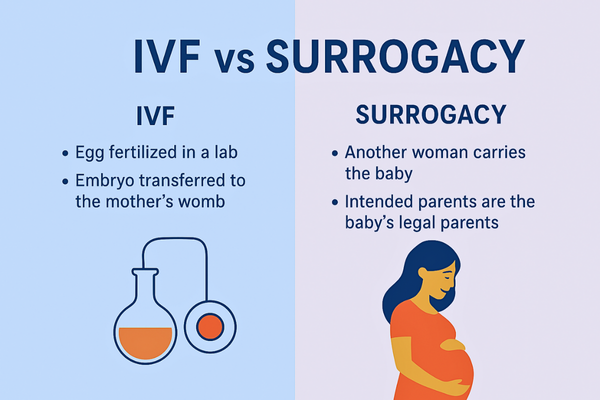Introduction
Navigating the path to parenthood can feel overwhelming, especially when faced with a range of assisted reproductive technologies (ART).
Two of the most common options are IVF and surrogacy, and while they are often discussed together, understanding the IVF and surrogacy difference is essential. This guide will clarify the distinction between these two family-building methods, providing a straightforward comparison of what each process entails.
We will explore the different reasons a person or couple might pursue one option over the other, including factors like medical needs, costs, and genetic connection. By the end, you’ll have a clear grasp of the key difference between IVF and surrogacy to help you on your journey.
What is In Vitro Fertilization (IVF)?
In Vitro Fertilization, or IVF, is a highly common and effective fertility treatment that helps people become parents. At its core, the IVF process involves fertilizing an egg with sperm outside of the body—literally “in vitro,” which means “in glass.”
This differs from a natural conception, which happens inside the body. For couples and individuals facing fertility issues, IVF offers a pathway forward.
The process is a series of carefully managed steps. First, medication is used to stimulate a woman’s ovaries to produce multiple eggs. These eggs are then retrieved during a minor surgical procedure called egg retrieval.
Next, they are fertilized in a laboratory setting with sperm from a partner or donor. Once the fertilized eggs develop into viable embryos, one or more are transferred into the intended mother’s uterus with the hope of a successful pregnancy.
This is the fundamental IVF and surrogacy difference: in standard IVF, the woman carrying the baby is the same woman who will be the mother. This allows the intended mother to experience the full journey of pregnancy and childbirth. https://dorengynaecareivffertility.com/in-vitro-fertilization-ivf/
What is Surrogacy?
Surrogacy offers a path to parenthood when an individual or couple is unable to carry a pregnancy themselves. In this arrangement, a woman, known as the surrogate, agrees to carry and give birth to a baby for the intended parents.
The surrogate’s role is to act as a gestational carrier for the full term of the pregnancy, providing a safe and healthy environment for the baby to grow. This is the central ivf and surrogacy difference—the woman who is pregnant is not the intended mother.
There are two primary types of surrogacy. In gestational surrogacy, which is the most common form today, an embryo is created through IVF using the intended parents’ eggs and sperm (or donor eggs/sperm).
This embryo is then transferred to the gestational carrier. In this scenario, the surrogate has no genetic connection to the child. The second type, traditional surrogacy, is less common and involves the surrogate’s own egg, making her the child’s biological mother.
The significant ivf and surrogacy difference here is that surrogacy introduces a third party into the pregnancy, which involves a comprehensive screening process and legally binding contracts to protect everyone involved. https://dorengynaecareivffertility.com/surrogacy-cost-in-nigeria/
The Key IVF and Surrogacy Difference
The main IVF and surrogacy difference is straightforward: IVF is a medical procedure, while surrogacy is a family-building arrangement that often incorporates IVF. The person who carries the pregnancy is the primary point of distinction.
In a typical IVF cycle, the woman undergoing the treatment is also the one who becomes pregnant. With surrogacy, a separate individual, the gestational carrier, is the one who carries the pregnancy to term on behalf of the intended parents.
This leads to several other important distinctions. The IVF and surrogacy difference in genetic connection, for instance, is clear in gestational surrogacy, where the baby has no biological link to the surrogate.
This is not the case with traditional surrogacy, where the surrogate is also the egg donor. Furthermore, the financial commitment for each path varies significantly. IVF costs are typically confined to the medical procedures, medications, and clinic fees.
Surrogacy, however, is a much larger financial undertaking, as it includes compensation for the surrogate, legal fees to draft the necessary contracts, and fees from a surrogacy agency.
Another crucial difference between IVF and surrogacy is the legal framework. While IVF has its own set of legal consent forms, the surrogacy journey is far more complex. It requires robust legal contracts to establish the rights and responsibilities of all parties, including the intended parents and the gestational carrier, ensuring a smooth transition of parental rights after birth.
The emotional aspect also differs; while IVF can be emotionally taxing for the intended parents, surrogacy introduces a new emotional dynamic involving the relationship with the surrogate.

When to Choose IVF vs. Surrogacy
It can be challenging to decide which path is right for you, but understanding the ivf and surrogacy difference in their intended use can help. The choice often comes down to a combination of medical necessity and personal preference.
IVF is typically the best option for people who can carry a pregnancy to term but have difficulty conceiving naturally. This includes those with issues like blocked fallopian tubes, ovulation disorders, or male factor infertility.
Many people also choose IVF because they want to experience pregnancy and childbirth themselves. The procedure gives them a way to overcome a medical obstacle while still being the one to carry their child.
Surrogacy is the logical choice for those who are physically unable to carry a pregnancy. This could be due to a missing or non-functioning uterus, a medical condition that makes pregnancy dangerous, or repeated, unsuccessful IVF cycles.
Surrogacy is also the path for single men or male same-sex couples who want to have a child. The core ivf and surrogacy difference here is about who is physically able to be pregnant. This process allows intended parents to build their family even when experiencing pregnancy themselves isn’t an option.
Is IVF a type of surrogacy?
No, that’s a common misconception. IVF is a medical procedure used to create an embryo. While it is a necessary part of most surrogacy arrangements (specifically gestational surrogacy), the two are distinct. The primary ivf and surrogacy difference is that IVF is a fertilization method, while surrogacy is a family-building arrangement where a gestational carrier is involved.
Is the baby in surrogacy biologically mine?
In gestational surrogacy, yes. If the embryo is created using your egg and your partner’s sperm, the baby will be genetically related to you and have no genetic link to the surrogate. This is a crucial ivf and surrogacy difference when considering the genetic connection.
How much does surrogacy cost compared to IVF?
Surrogacy is significantly more expensive than IVF. While IVF costs typically cover medical procedures and medication, surrogacy involves additional expenses such as surrogate compensation, legal fees, and agency fees. The financial ivf and surrogacy difference is often one of the biggest deciding factors for many families.
